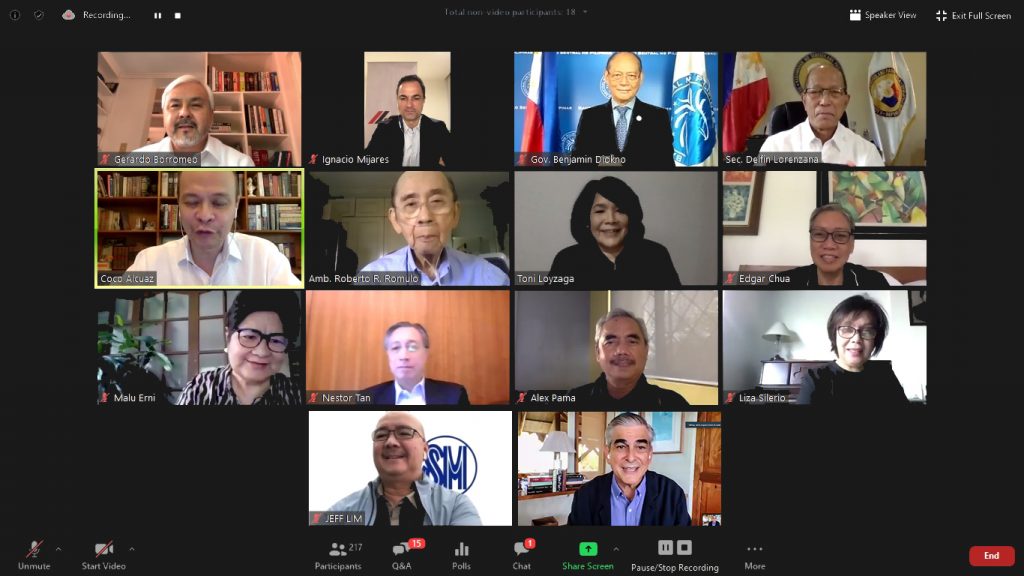In the News
Recent News

Paving the path towards recovery and resiliency
The country’s fight against the coronavirus disease 2019 (COVID-19) does not only drive the government, sectors, and communities to create solutions to recover from the crisis. It is also teaching them how to make the country more resilient to disasters of various kinds, as the recent roundtable discussion hosted by the Makati Business Club (MBC) and the National Resilience Council (NRC) revealed.
The digital forum held last May 22, with the theme “Recovery & Resilience: Rethinking Growth Post-COVID”, highlighted insights from Bangko Sentral ng Pilipinas (BSP) Governor Benjamin Diokno, the forum’s keynote speaker, and Jaime Augusto Zobel de Ayala, chief executive officer (CEO) of Ayala Corporation and co-vice chairman of MBC.
The forum was also participated by Defense Secretary Delfin N. Lorenzana; Ambassador Roberto R. Romulo, governor of NRC and chairman emeritus of Zuellig Family Foundation; Nestor Tan, president and CEO of BDO Unibank; Gerardo Borromeo, vice chairman and CEO of Philippine Transmarine Carriers, Inc. (PTC); and Ignacio Mijares, president and CEO of CEMEX Holdings Philippines.
Fast, fact-based response
Providing a perspective from the private sector, Mr. Zobel de Ayala highlighted the value of collaboration and data-based decisions, as well as the need to provide efficient solutions at a fast pace in dealing with the current crisis.
He noted a parallel between how the NRC pursues climate resiliency and how the country combats the COVID-19 crisis as both involve public-private partnerships and the use of data and science.
The Ayala Corporation CEO pointed out that the private sector has working hand-in-hand with the government and local government units in terms of helping vulnerable individuals, protecting frontliners, and sharing data and analyses with key government agencies.
He further noted that data and science are very helpful at a time when both sectors have big and unfamiliar decisions to make.
“The data we use is far from perfect, but it is reassuring to know that we’re making decisions based on facts and not just suppositions,” Mr. Zobel de Ayala said.
The MBC vice-chairman also stressed that employment should remain among the top priorities in the ongoing fight against COVID-19, adding that programs and proposals relevant to the crisis should eventually preserve or create jobs.
Mr. Zobel de Ayala also suggested that the government should formalize a structured wage subsidy program at a time when businesses hardly can pay their employees further and might be forced to lay them off or close down completely.
“The government gives money to those companies that keep their employees,” he explained. “This does not have to be a one-to-one subsidy. For many MSMEs, it is a maximum of just 8,000 per employee per month, for just two months. But that help may be enough to help companies just to keep their employees.”
Furthermore, he emphasized that the speed of execution is key to successfully address the crisis and hasten the path to recovery and resilience.
“We are no longer in a position to hesitate, and an important momentum will be lost if we don’t execute fast,” Mr. Zobel de Ayala said.
Need for structural reforms
For his keynote presentation on macroeconomic recovery and national resilience after the pandemic, Mr. Diokno laid out the big picture of the country’s economic situation during the crisis and stressed certain reforms necessary for the country to thrive from it.
He noted that out of the exogenous shocks in the first quarter—which includes the Taal Volcano eruption, the tensions between the United States and China, and African Swine Fever—nothing comes close to the COVID-19, which has brought the economy to a standstill.
“The confluence of these shocks resulted in the contraction of the economy by 0.2% in the first quarter of 2020,” he added.
On the other hand, Mr. Diokno spotted a positive note on the peso’s performance compared to the depreciation of regional currencies against the US dollar, as well as the reform agenda that the government has pursued across administrations, which he finds has allowed the country to achieve growth.
In terms of how the BSP has tackled the COVID-19 crisis, Mr. Diokno pointed out the measures it promptly implemented to ease liquidity and sustain flow of credit. He also highlighted the Central Bank’s support for the micro, small, and medium enterprises (MSMEs) as it allowed banks to create new loans to the sector.
He nonetheless recognized that there is still much work to be done. “The crisis has exposed the vulnerabilities and gaps in existing processes and systems that we need to swiftly deal with to cover lost momentum because of the COVID-19,” Mr. Diokno pointed out.
The BSP governor shared four structural reform imperatives that are critical as the country recovers from the crisis.
First, Mr. Diokno highlighted the need for modernizing the country’s health system.
“This would require giving incentives to the use of science and technology in health policy decision-making. It would require overhauling of healthcare supply chain management,” he explained. “The government must also initiate the formulation of a national preparedness and response framework for disease outbreaks and pandemics, taking into account coordination gaps across different levels of government.”
The country’s information and computer technology (ICT) system and processes must be massively upgraded, Mr. Diokno added. For the BSP governor, technology will play a pivotal role in reshaping the means of production and delivery of goods and services in the post-COVID world, and the demand for digital technology will be heightened.
He also pointed out that digital technology will be critical in enabling simpler and more efficient transactions with government agencies, and will also serve as a key to the government’s monitoring and evaluation systems for policy responses and action.
Mr. Diokno also recommended the modernization of the country’s agriculture and government’s supply chain management system, with the help of digital technology, which he finds will help ensure that food and essential goods and services will be available, accessible, and affordable.
An efficient logistic system for farmers, for instance, will ensure that farm produce are made available to Filipino consumers and provide Filipino farmers the right full share in the gains from production.
Developing a highly skilled and resilient workforce is also another reform Mr. Diokno finds vital as the country bounces back from the crisis. He suggested strengthening the educational system and providing adequate health protection to workers to future-proof the country’s workforce, which is one of the youngest labor forces relative to other Southeast Asian countries, according to the United Nations.
Furthermore, the BSP governor observed that as the preference for electronic payment and financial services is set to heighten, there is a need to increase contact-less payment facilities such as PayMaya and GCash. He also sees the need to quicken the adoption of a national quick response code standard to enable interoperable payments from person-to-person and person-to-merchant transactions.
Mr. Diokno also noted that the national ID system will enable inclusive and innovative digital finance and ensure a reliable database for the design and impact assessment of policies.
Resilient industries
In response to Mr. Diokno’s keynote presentation, Mr. Tan of BDO Unibank, Mr. Borromeo of PTC, and Mr. Mijares of CEMEX Holdings expressed their support for the governor’s initiatives and added their respective insights on moving towards resiliency.
Mr. Tan expressed his support for the national ID system, regarding it as the cornerstone of financial inclusion. He suggested that this system should be biometric-based, federated instead of centralized, self-sovereign, enabled with audit trails, and accessible yet secure.
He also noted that a challenge lies in creating a COVID-safe and controlled operating economic communities. “How do we create self-contained communities that operate with very limited chance or risk of getting infected or infecting others?” he asked.
Mr. Borromeo, meanwhile, stressed that the maritime industry should prioritize preserving the jobs of seafarers as well as shifting towards an innovative and creative way of developing talent.
“This industry is no longer just about putting people on ship,” he said. “It is about putting the type of people who have the skill sets necessary to work in a more digital and technologically-advanced industry, and at the same time to continue to promote digital transformation not only in the way we work but in our ability to handle transactions.”
Mr. Mijares, for his part, anticipates infrastructure to be a crucial part of new fiscal measures to help revitalize the economy in terms of creating jobs and moving towards inclusive sustainable development.
He also sees an opportunity to reduce population density through infrastructure. “The pandemic has highlighted even more the need for accessibility networks, healthcare infrastructure, rethinking urbanization, technology investment, and the need to redistribute growth outside Luzon, particularly Metro Manila,” he said.
SOURCE:
BusinessWorld. (2020, May 27). Paving the path towards recovery and resiliency. BusinessWorld. Retrieved from https://www.bworldonline.com/paving-the-path-towards-recovery-and-resiliency/
Recent News

PREPARE. ADAPT. TRANSFORM.
National Resilience Council
MOA Square, Seashell Lane cor.
Coral Way, Mall of Asia Complex, Brgy. 76
Zone 10, CBP 1A, 1300, Pasay City
Metro Manila, Philippines
Copyright ©️ 2024. National Resilience Council. All Rights Reserved.

